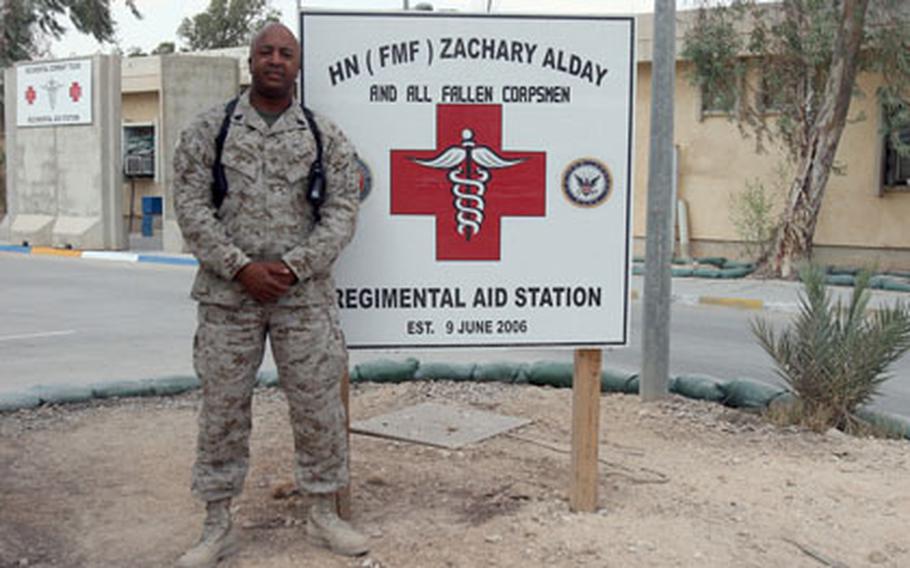
Navy Senior Chief Hospital Corpsman Terry Anderson, 41, of Beaumont, Texas, the senior enlisted leader responsible for all Navy hospital corpsmen in western Anbar province, Iraq, outside the Regimental Combat Team-2 aid station (Courtesy of U.S. Marine Corps)
Mideast edition, Saturday, August 25, 2007
CAMP RIPPER, Iraq
Like a father mourning dead children, his heart aches each time he passes the wall that honors their names in the hallway of the regimental aid station.
The names, more than 50 of them, are those of U.S. Navy hospital corpsmen serving with U.S. Marines, and killed, nearly all of them by enemy action, in Iraq or Afghanistan.
Their names are on a wall in a corridor of Regimental Combat Team-2’s aid station at Camp Ripper, on Al Asad Air Base in Iraq’s western Anbar province. A sign outside the tan, one-story building gives its name: “HN (FMF) Zachary Alday And All Fallen Corpsmen Regimental Aid Station.” Alday was killed in June 2006 while serving with Marines in Anbar province.
Inside, at one end of the white-walled aid station’s corridor, a section of wall bears some of the names under color photographs of the dead, while other names are painted on the wall in black lettering inside a scroll design. A legend reads: “In memory of our fallen Corpsmen who made the ultimate sacrifice while honorably serving their country.”
Navy hospital corpsmen are embedded with U.S. Marine units and serve with them in combat.
Traditionally referred to by the Marines as “Doc,” the corpsmen are widely respected by the Marines, and have a longstanding reputation for their bravery and skill in tending to wounded Marines under fire.
To Senior Chief Petty Officer Terry Anderson, 41, the senior enlisted leader responsible for all Navy hospital corpsmen in western Anbar province, the dead are a presence still deeply felt.
He can barely speak of them without tears.
“I’ve been here eight months,” said Anderson in an interview in his office Wednesday. “I pass, I see that wall every day, and I still feel that ache in my heart.
“And I see their eyes. How young they are. … Wow. It just blows me away,” he said, momentarily unable to continue.
“For each sailor, each Marine, that comes through here, I’m proud. And I show them that bulkhead.”
A look of sober reverence comes into their faces, he said.
Those deaths, he says, serve partly as a reminder that military service can have life-and-death consequences for servicemembers, including those young corpsmen under his charge.
“Before I go to bed at night, I say a prayer for all the men here and I … I pray to God that I never lose one, because they’re like my children.”
“And I feel, I don’t want to lose any of them,” he said. As he spoke, tears rimmed his eyes. His voice quavered at times.
“I feel so emotional, just talking about it,” he said.
“I’m very proud of these guys, very proud,” he said of the hospital corpsmen throughout western Anbar.
“I feel like their father. I’m like their father,” he said.
“It’s not only corpsmen that we see every day” at the regimental aid station, but those serving with Marines elsewhere around western Anbar.
He tells his subordinate leaders they have a grave responsibility to look out for the corpsmen under them.
“I prepare ’em every day. I … bring home to them every day the reason why we’re here. So complacency doesn’t set in.”
Remember those corpsmen who’ve given their lives, he tells them. In life, they were eager to “be living their lives and doing all the things we are doing.
“I have all of them look” at the names and photos on the wall, including those in line for promotion to noncommissioned officer rank.
“I have them take a look at that wall. I tell them, ‘Don’t forget — they’re your sailors. Sailors with names. Don’t forget.”
In daily huddle, tribute made for the fallen
Displaying on a wall the names of U.S. Navy hospital corpsmen killed in Iraq and Afghanistan isn’t the only way their fellow corpsmen at Camp Ripper, Iraq, honor the memory of the dead.
Each day after their morning run, the corpsmen at the Regimental Combat Team-2 aid station, also pay them tribute.
With their hands placed over one another’s football style, one of the corpsmen may say aloud the names of some of the dead.
Or, someone will say, “‘For all the Corpsmen who’ve been here in Iraq who’ve put their lives down … On three … Hospital Corpsmen!’” according to Petty Officer 2nd Class Richard Amarh, 29, originally from Accra, Ghana, and now of Jacksonville, N.C. He’s assistant leading petty officer at the aid station.
There may also be a prayer if one of them wants to offer one, Amarh said.
“Basically prayers to console family members or friends,” he said. “Some of the guys on the wall, we actually know them personally.”
— Franklin Fisher